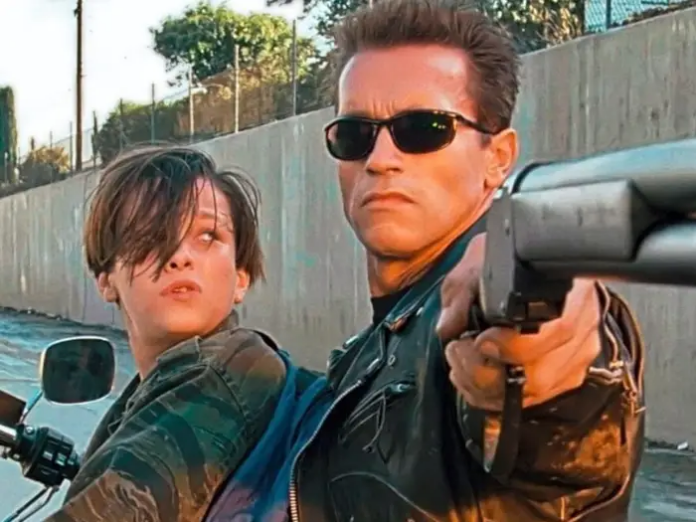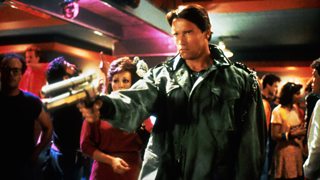
The Terminator was released 40 years ago, on 26 October 1984. James Cameron’s science-fiction thriller turned its star into one of the biggest Hollywood action heroes of the 1980s and 1990s – and it was all because he chose to play the bad guy, as he told the BBC in 1985.
Arnold Schwarzenegger never did anything by halves. For his breakthrough role in The Terminator, he claimed to have spent hours blindfolded every day, practising how to take apart and reassemble futuristic weapons, “to really show that I’m an expert coming back from the year 2028 to our present time in Los Angeles”.
It was this combination of honest toil and marketing pizzazz that would rocket Schwarzenegger’s career to unprecedented heights. His deadpan charisma helped. Few actors could deliver a simple line like “I’ll be back” and turn it into a career-defining catchphrase.
But just as important was his willingness to put in the hours required to achieve his ambitions, and to be open about all that work. “You have to lock into a whole different kind of emotional obligation to play a machine,” he told the BBC’s Breakfast Time on a promotional trip to London in January 1985. “The way you walk is quite different. The way you handle your guns is different. The way your facial expressions are when you kill and all those kind of things, because you’re not supposed to have any feelings.”
Schwarzenegger’s previous films had been moulded around his imposing physique. In his 1970 film debut Hercules in New York, the reigning Mr Universe was credited as Arnold Strong. With the success of 1982’s Conan the Barbarian and the 1984 sequel Conan the Destroyer, his long surname became a trusted brand for action fans.
The sleek science-fiction of The Terminator was a big upgrade on sword-and-sorcery, and Schwarzenegger had a clear vision of how he wanted to present himself. “I was offered the part of playing the good guy, the hero,” he said.
“I then read through the script and I was more fascinated with the character of Terminator. It was a much more interesting character playing a robot – like in Westworld, Yul Brynner played somebody with no emotions and with no feelings and no pity for anything – and to play this kind of a character.”
Schwarzenegger said he pitched the idea that he should play Terminator model T-800 to the film’s director, James Cameron. “I thought it was a big step forward in my career,” said Schwarzenegger, “because I played all along always the hero, like in the Conan movies, for instance. Also, it was a good part for me to play because it was really the first time acting in a film where I didn’t really have to rely on physical development, like in the Conan films.”
Once The Terminator was a box-office smash in the US, Schwarzenegger had his eye on the next phase of his career.
“It has opened up a whole new thing for me, and of course the most important thing in acting is to be able to get roles in many different areas rather than just get typecast,” he said.
For Schwarzenegger, it was all about seizing opportunities. He had come a long way since the writer and broadcaster Clive James memorably likened the shirtless bodybuilder’s appearance to “a brown condom full of walnuts”. On Fame in the Twentieth Century, James’s 1993 BBC series about celebrity, he cast his eye over the former Mr Universe’s journey towards becoming “the first fully self-constructed superstar”. James observed: “For his big breakthrough film, he played himself – that is, an android; somebody someone had built. And somebody had built him – he had.” According to the critic, Schwarzenegger’s “brightest move of all was to let the media in on his secret”. He said: “The tongue in his cheek was hard to see amongst all his other bulges, but the press loved the way he didn’t hide the hustle. He made his career the story.”
The bodybuilder nicknamed the Austrian Oak was always openly ambitious in a way that was perhaps more brashly American than European. Having created his multiple Mr Universe-winning body, he came to mainstream attention in the 1977 docudrama Pumping Iron. At that year’s Cannes Film Festival on the French Riviera, he explained to the BBC that he was not a trained actor, but was using his body as “a vehicle to break into the films”.
Marketing masterstrokes
“It’s something that carries me through until I’m established in acting,” he said. When asked if he believed his acting talent could equal his bodybuilding skill, he was in no doubt: “When I was 15 years old, I’d said I would be the best or the greatest bodybuilder of all times and I have done it. Now I’m just as confident as when I was 15 – I can say now I will be the best actor around.”
By the early 1990s, almost everything had gone according to plan. While he may not have been the best actor around, Schwarzenegger was unquestionably one of Hollywood’s biggest stars. He had gone from Conan the Barbarian to big budget sci-fi epics such as Total Recall and Predator, via high-concept family-friendly comedies such as Twins. Every career move was a marketing masterstroke, reaching out to ever expanding demographics. In the first Terminator, he was a terrifying villain. By its sequel, Terminator 2: Judgment Day, he was the hero.

On the 1991 BBC documentary Naked Hollywood, he looked back at the obstacles he had overcome on his way to the top. “I made up a programme, went to a lot of acting classes, voice classes, accent removal classes, and on and on and on, and really laid out a plan on how to market myself – and then I met the most incredible resistance that you can imagine,” he said.
While prospective agents mocked his Austrian surname and urged him to change it, Schwarzenegger had the last laugh. “Everyone was basically saying to me, you have very little chance in this profession simply because there is no one that we know who has come from Europe that has really gone through the roof, that has made it really huge in this business.”
He said that having lived around half his life in Austria and the other half in the US, he identified as an Austrian-American: “I’m extremely happy that I came to the United States and became a citizen of this country, because this is really the country that represents a beautiful vision of great opportunities and endless possibilities, where a dream can come true – in my case, I’m the perfect example of that.”
His Austrian birthplace meant he could never complete his American Dream bingo card by making it to the White House; even Arnie was no match for the US Constitution.
In 2003, he weathered campaign allegations of groping and cheating – behaviour that he eventually acknowledged as “wrong” – to be elected governor of California in 2003. Inevitably, he was nicknamed the Governator.
